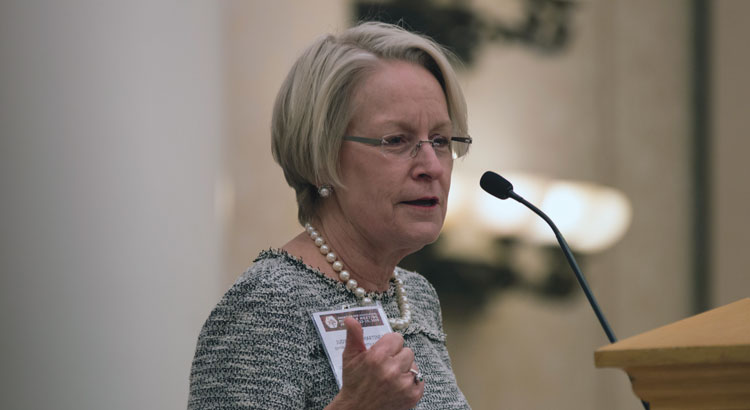ABA House OKs resolutions on criminal justice, LGBT rights, immigration issues

Photo of ABA President-elect Judy Perry Martinez by Mitch Higgins/ABA Media Relations
The ABA House of Delegates had much on its agenda at the 2019 ABA Midyear Meeting in Las Vegas.
The policymaking body of the association passed a slate of criminal justice resolutions, including ones on clarifying expungement procedures, tightening child abuse laws and ensuring female prisoners have access to toilet paper and feminine hygiene products. Two late-breaking resolutions and their reports condemned the federal government shutdown that ended in January and opposed disaster-relief funds allocated by Congress being redirected to fund other items like a border wall. Delegates also voted to condemn the federal government’s “zero tolerance” policy for people caught crossing the border illegally and to urge that the federal judiciary take measures to ensure that illegal-entry defendants are represented by counsel.
Some delegates were moved to stand and speak in favor of resolutions, as ABA President-elect Judy Perry Martinez did for Resolution 113, which opposed laws that discriminate against LGBT people exercising their right to parent. Martinez told the House about the experience of her niece and her niece’s wife. In the process of becoming foster parents, the couple had a home visit from a woman who was plain about her personal beliefs.
“She advised them that she was Baptist but regardless of what she believed, she was going to fulfill her duties and do what the law required,” Martinez said. “She followed the law with respect, fairness and equality.”
Martinez’s niece and her wife have now fostered 20 children and are on track to adopt their third child this spring. Martinez urged the House to help create more such stories by voting for the resolution. Overwhelmingly, it did.
RESOLUTION ROUNDUP
- Two resolutions proposed by the Young Lawyers Division were approved to make the legal profession more family-friendly. Resolution 101A called for lactation areas to be established in courthouses, and Resolution 101B urged courts to grant continuances for attorneys who are taking parental leave, as long as reasonable conditions are met.
- Resolution 104 encourages courts to take a consistent approach to the “fair use” doctrine. It asks that repackaging and distribution of a copyrighted work not be deemed a “transformative” act in favor of fair use, regardless of whether the copyrighted material is delivered more efficiently or in a market the owner has not yet entered.
- Two gun-related resolutions were passed. Resolution 106A opposes laws authorizing
teachers and other nonsecurity school em-
ployees to carry guns at pre-K through grade 12 schools. It also opposes the use of public funds to arm and train them. Resolution 106B and its report aim to reduce suicides by letting people voluntarily opt in to a list of people to whom guns should not be sold. People would be able to take themselves off the list, but there would be a waiting period. - Resolution 107A supports requiring a warrant based on probable cause for seizures and forensic searches of electronic devices carried by American citizens and lawful permanent residents at border crossings. It urges legislation to set this standard for searches and seizures of devices and for protection of attorney-client privilege.
- Resolution 107B asks legal employers not to require mandatory arbitration of unlawful discrimination, harassment or retaliation claims “based upon race, sex, religion, national origin, ethnicity, disability, age, sexual orientation, gender identity or expression, marital status, genetic information or status as a victim of domestic or sexual violence.” The resolution builds on a measure approved at the 2018 annual meeting that urged legal employers not to require mandatory arbitration of sexual harassment claims.
- Resolution 112 seeks to eliminate inconsistent pet breed bans found across military branches. It falls in line with past ABA support of national trends in breed-neutral dangerous dog legislation that targets behavior rather than appearance.
- Resolution 114 urges Congress to enact legislation affirming that discrimination based on sexual orientation or gender identity is sex discrimination under the Civil Rights Act, and that religious freedom laws don’t authorize otherwise illegal discrimination.
- Resolution 116 urges nations to enact international compacts on refugees and immigration; discourage criminal prosecution of immigrants, refugees and asylum-seekers; protect members of those groups from bias and discrimination; and address the root causes of displacement. It was the first House of Delegates resolution the ABA Rule of Law Initiative has ever sponsored.
Sidebar
PRESIDENT-ELECT NOMINEE
Patricia Lee Refo addresses the ABA House of Delegates after the Nominating Committee selected her as president-elect nominee. Refo is a partner at Snell & Wilmer in Phoenix and has served as chair of the House and the Section of Litigation. Her nomination virtually assures that she will be formally selected by the House as president-elect in August and begin serving her one-year term as president after the close of the 2020 ABA Annual Meeting. “The strength of this extraordinary association is the breadth of the work that we do, and my goal is to continue the work of those who have come before me,” Refo told the ABA Journal.



